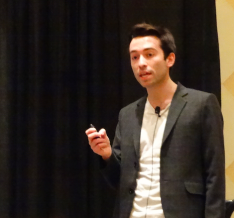Tabloid journalism is like sugar and we need to find a way to curb people’s usage says PR exec
A leading PR practitioner has likened tabloid journalism to sugar, and suggested there needs to be measures put in place to curb people’s usage of the medium.
Michael Bodansky, press consultant at Freud Communications pointed to the dominance of tabloid journalism and in particular the rise of the Daily Mail’s online arm, and questioned how it was impacting the way people viewed the world.
“Tabloid journalism is like sugar – we don’t know how much were consuming, most of us probably consume too much, we’re surrounded by it and it tastes great,” he said in a session called ‘Tabloid Takeover: How the Daily Mail Won’ at SXSW.



Get this git off the stage. This pompous ignoramus has the temerity to point the finger at tabloid press from the Lily white precinct of PR. 95% of PR releases end up as editorial filler in a niche blog, or better, deleted without opening. The other 5% hang on to their tabloid contacts for dear life.
It is just a churning machine that turns constantly. It is exactly that! The PR industry just pretends to put a science behind it.
So much money is wasted on PR when the actual messenger, the media (ie magazine etc) is not rewarded for doing it’s job, That is, telling people about product(s).
I think my Scepticism Meter just broke.
@Richard Dirth, @Scoop,
Are you basing your assertions on data, or is what you’re saying just based on your opinion?
Having worked in the industry I agree with Michael Bodansky. I think what he says is definitely the case for the leading PR agencies and the majority of PR spend.
The creation of press releases and distributing them would not make up 10% of the revenue of a quality PR agency.
Don’t know why he picks on the daily mail. In Australia all media have succumbed to the click bait nonsense driven by their ridiculous belief that traffic volumes equal success. Reality is that the dumb decisions that began back in 1994 with web sites are a far bigger driver of garbage media than anything else. As the guardian etc have finally discovered traffic is just noise.